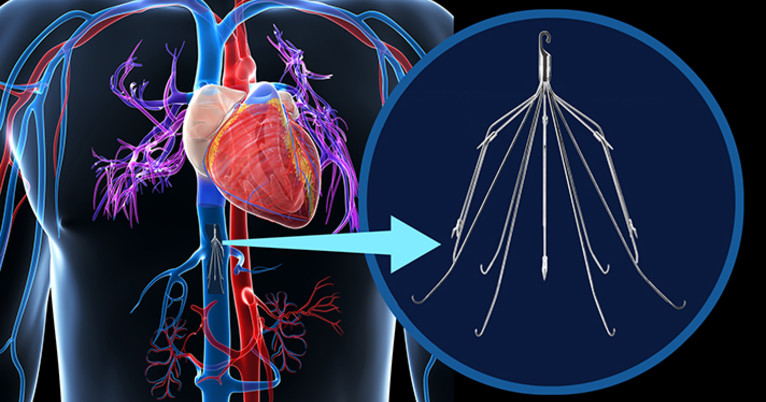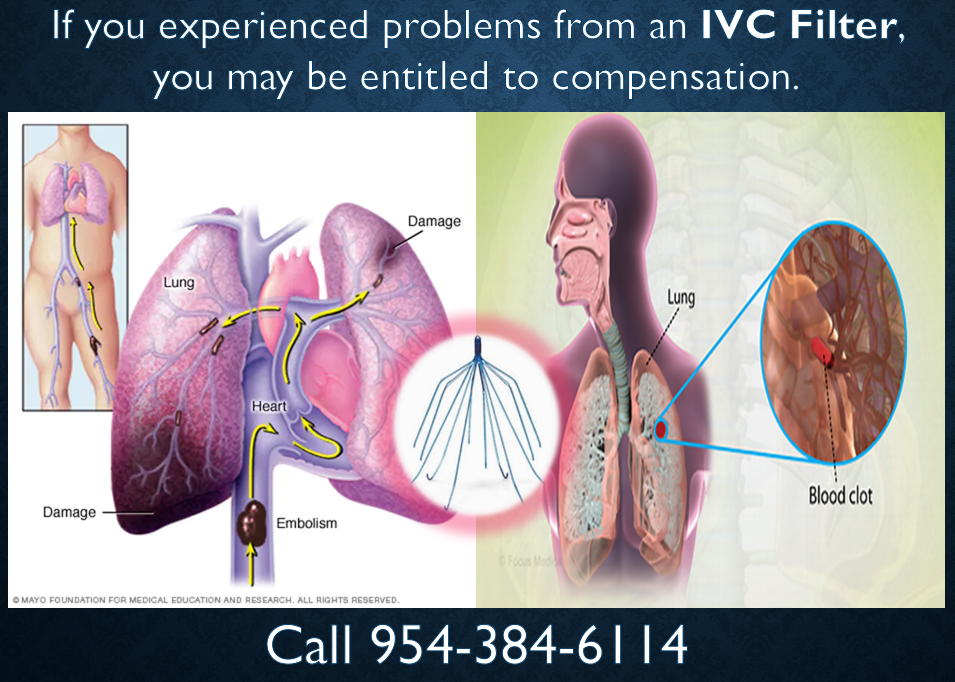Do you need an IVC filter lawsuit attorney? Call an IVC Filter Lawsuit Lawyer at 954-384-6114, If you experienced problems from an IVC Filter, you may be entitled to compensation.
Cook Medical and C.R. Bard, both American manufacturers of medical devices, develop inferior vena cava (IVC) filters. IVC filters, used by patients who are unable to take blood thinners, are meant to prevent blood clots from travelling to the lungs and heart through the bloodstream, otherwise known as a pulmonary embolism. These small, cage-like devices are implanted in the main blood vessel, the inferior vena cava, and “filter” out or block blood clots while letting blood pass through.
As of October 2021, both companies have faced over 18,000 lawsuits combined over allegations that these IVC filters and its metal components are migrating and perforating patients’ veins and organs such as the heart or lungs. In some extreme cases, IVC complications have turned fatal.
Deadly Shortcomings
Bard first obtained permission from the FDA to manufacture their “Recovery” series IVC filter in 2002. According to a NBC News investigation, after being a mere 3 years in the market, the “Recovery” filter had to be replaced with another filter, called the G2, since the “Recovery” filter started exhibiting serious, and sometimes deadly, shortcomings. Unfortunately, the second filter exhibited problems less than a year after being introduced to the market.
Internal memos written in 2005 indicate that a C.R. Bard executive knew about the apparent threat that the G2 filter posed to patients, citing problems with migration and perforation. For the next couple of years C.R. Bard received reports that showed the G2 filter had more fractures, migrations and perforations than any of its competitors. Nevertheless, C.R. Bard’s filter remained on the market until as late as 2010, while leaving other versions of their IVC filters for sale.
IVC Filter Lawsuit: The Word Is Out

Picture courtesy Harvard
In 2014, the FDA issued a public advisory commenting on the problems observed with IVC filters, specifically citing “device migration, filter fracture, embolization (movement of the entire filter or fracture fragments to the heart or lungs), perforation of the IVC, and difficulty removing the device.” After conducting a quantitative review, the FDA concluded that IVC filters ought to be removed as soon as the transient risk of a pulmonary embolism passed, because from that point on the use of an IVC filter would be expected do more harm than good.
Despite the guidance issued by the FDA to physicians, many Americans still found themselves having to deal with complications of IVC filters. Consequently, two multi-district litigations were formed in the Southern District of Indiana and the District of Arizona to address the growing amount of lawsuits coming against Cook and Bard, respectively. Multi-district litigation, commonly referred to as an MDL, aims to expedite the resolution of thousands of individual lawsuits through bellwether trials. Bellwether trials allow both parties to test their arguments and see how a jury might rule, and often enough these bellwether trials expedite global settlements.
What’s Next?
So far, Bard and Cook have each faced multiple bellwether trials and have had to pay $3.6 million and $3 million to victims, respectively. Bard has already tried to appeal the award, but a 9th circuit ruling upheld the lower court’s decision ruling that since Bard filters caused perforations at a higher rate, Bard should have included a warning in the product label.
If you had an IVC filter implanted after 2011 and suffered any complications from the use of an IVC filter or have a loved one who unfortunately died as a result of IVC filter complications, you may be entitled to compensation.
The most frequent complications related to the IVC Filters are:
- Filter migration –The device dislodges from where it was initially implanted and moves towards the heart or lungs. This can lead to severe complications such as heart failure, flow blockage, internal bleeding, tearing of veins and arteries, extra fluid buildup around the heart (cardiac tamponade) and death.
- Punctured organs – Pieces of the device such as the legs or struts can break off inside the body and migrate elsewhere in the body creating potentially life-threating complications. This can puncture organs such as the heart and/or lungs. Complications include internal bleeding, heart attacks, torn veins and arteries, cardiac tamponade and death.

Picture courtesy Mayo Foundation
Please note: If the device and/or pieces were to migrate, another risk is that of pulmonary embolism (blood clots) which may return as there is no longer a filter to prevent a blood clot from traveling to the lungs.
Other complications include:
- Removal, revision and replacement surgeries
- Chest pain
- Shortness of breath
- Death
Our team at Oppenheim Law recognizes the emotional burden these impairments can have on individuals and their lives. That is why our firm provides a team of professionals committed to zealously represent our clients.
Please feel free to call us at (954) 384-6114, contact us at contactus@oppenheimlaw.com, or chat with us at www.oppenheimlaw.com so we can inform you of your legal rights so you can obtain the compensation to which you are entitled.
Originally posted at: https://www.oppenheimlaw.com/ivc-filter-lawsuit-attorneys/
















